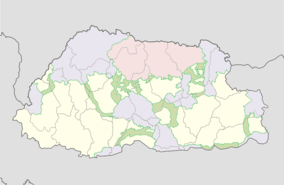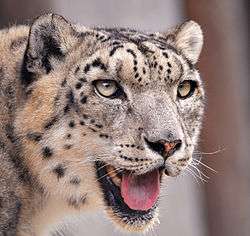Wangchuck Centennial National Park
Wangchuck Centennial Park in northern Bhutan is the kingdom's largest national park, spanning 4,914 square kilometres (1,897 sq mi) over five districts, occupying significant portions of northern Bumthang, Lhuntse, and Wangdue Phodrang Districts. It borders Tibet to the north and is bound by tributaries of the Wong Chhu (Raidāk) basin to the west. Wangchuck Centennial directly abuts Jigme Dorji National Park, Bumdeling Wildlife Sanctuary, and Thrumshingla National Park in northern Bhutan, and is further connected to Jigme Singye Wangchuck National Park in central Bhutan via biological corridors. Thus, most of northern Bhutan is part of these protected areas.[1]
| Wangchuck Centennial National Park | |
|---|---|
 | |
| Location | Bumthang, Gasa, Lhuntse, Trongsa, Wangdue Phodrang, Bhutan |
| Area | 4,914 km2 (1,897 sq mi) |
| Named for | House of Wangchuck |
| Website | Bhutan Trust Fund for Environmental Conservation |
Wangchuck Centennial was established on December 12, 2008 in honor of the Wangchuck dynasty, founded in 1907. It contains headwaters of four major river systems: Punatsang Chhu, Mangde Chhu, Chamkhar Chhu, and Kuri Chhu. Wangchuck Centennial also contains the various middle-Himalayan ecological biomes, ranging from blue pine forests to alpine meadows, at altitudes from 2,500 metres (8,200 ft) to 5,100 metres (16,700 ft).
Flora and fauna
The park is home to over 200 species of vascular plants, 23 species of large mammals and over 100 bird species. Notable wildlife species inhabiting Wangchuck Centennial include the Bengal tiger (Panthera tigris), snow leopard (Uncia uncia), wolf, takin (Budorcas taxicolor) and Himalayan black bear (Selenarctos thibetanus).[1]
See also
References
- "Parks of Bhutan". Bhutan Trust Fund for Environmental Conservation online. Bhutan Trust Fund. Archived from the original on 2011-07-02. Retrieved 2011-03-26.
